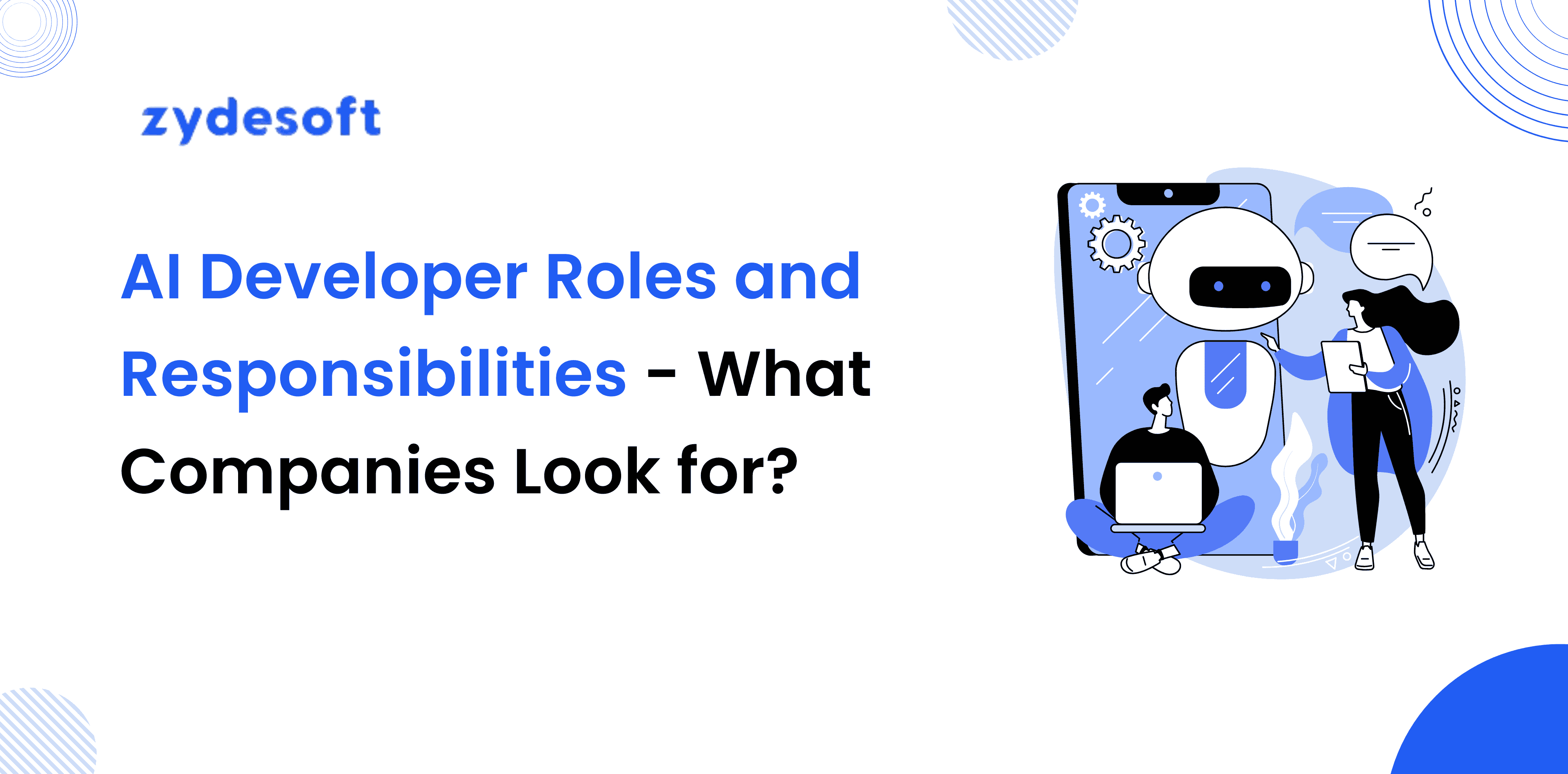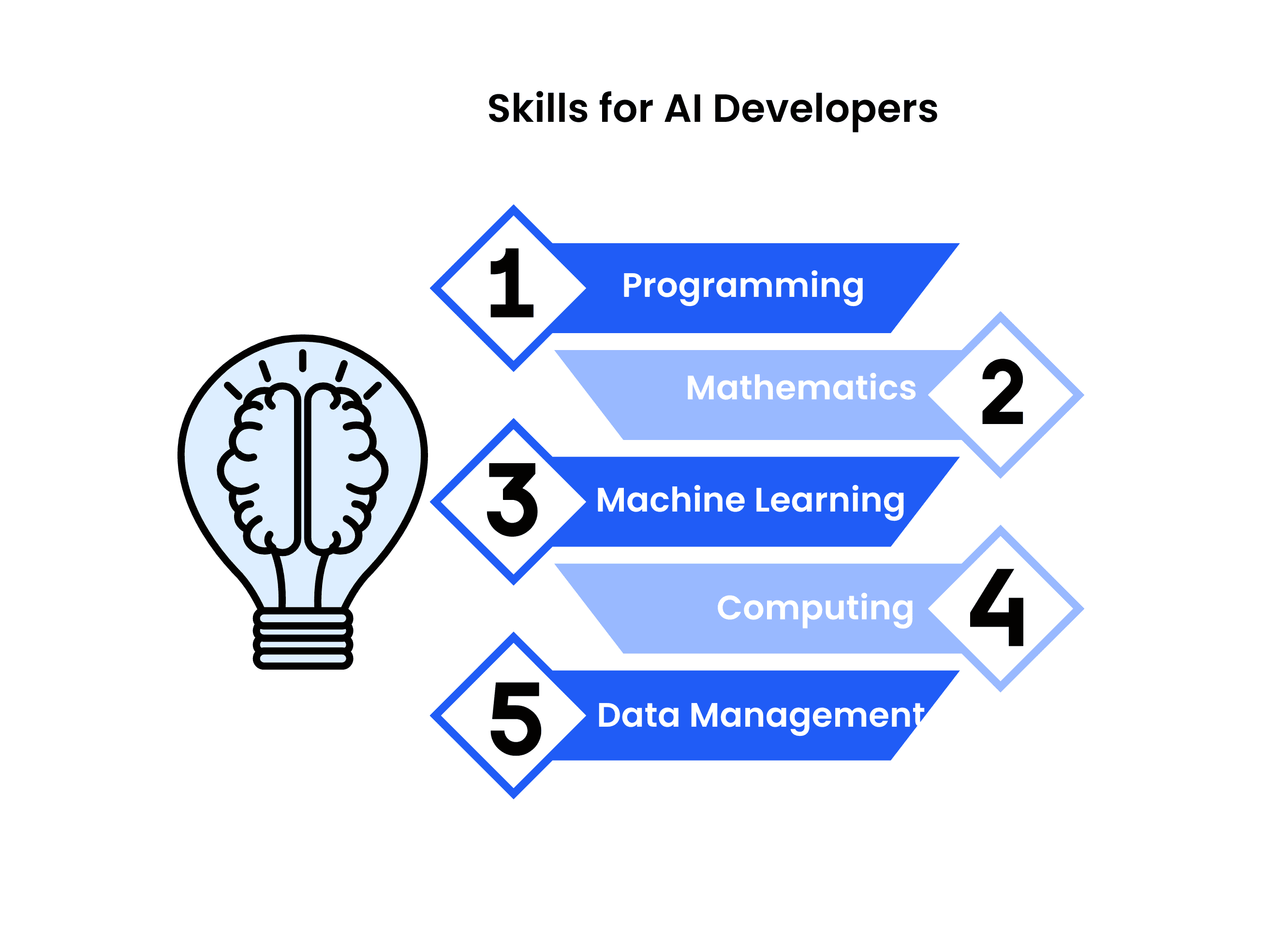
Artificial Intelligence (AI) has rapidly evolved into one of the most transformative technologies of the 21st century. From powering smart assistants like Alexa and Siri to revolutionizing medical diagnostics and autonomous vehicles, AI is reshaping industries and creating new career opportunities. As AI continues to integrate into our daily lives, the demand for AI professionals, particularly AI developers, is skyrocketing. But what does the role of an AI developer entail, and how can one excel in this career path?
This article delves into the roles and responsibilities of AI developer, the essential skills required, the challenges faced, and even the potential salary expectations for those entering this field. By the end, you’ll understand what it takes to grow in this profession and why AI development is one of the most sought-after careers today.
Let’s get detailed!
An AI developer is a software engineer with a specialization in building systems capable of mimicking human intelligence. They design, build, test, and deploy algorithms that enable machines to learn from data and make decisions. These developers are at the heart of the AI revolution, turning complex theoretical models into practical applications that can automate tasks, recognize patterns, and solve intricate problems.
1. Machine Learning Engineers – Focus on building and refining machine learning models and algorithms. They work with large datasets and develop models that improve over time through learning and adaptation.
2. Deep Learning Engineers – Specialize in neural networks and deep learning frameworks, such as TensorFlow and PyTorch, to handle vast amounts of unstructured data, including images and text.
3. NLP Engineers –Natural Language Processing (NLP) engineers work on systems that process and analyze human language. This includes tasks like language translation, sentiment analysis, and chatbots.
4. Computer Vision Engineers – These engineers develop algorithms that allow machines to interpret and process visual data, crucial for applications in healthcare imaging, autonomous vehicles, and surveillance.
| Type of AI Developer | Key Tools & Technologies | Example Applications |
| Machine Learning | Scikit-Learn, Pandas | Fraud detection, recommendation systems |
| Deep Learning | TensorFlow, PyTorch | Image recognition, autonomous driving |
| NLP | NLTK, SpaCy | Virtual assistants, sentiment analysis |
| Computer Vision | OpenCV, Keras | Medical imaging, surveillance systems |
This table highlights the diverse AI developer roles and responsibilities within AI development, showcasing the specific tools each type of developer may utilize.
AI developers are essential in creating algorithms and models that form the backbone of intelligent systems. These professionals are not only tasked with building models but also ensuring their real-world applicability. Here are the primary roles AI developers typically fulfill:
Model Development and Training:
AI developers create, fine-tune, and test models based on datasets that reflect real-world conditions. Model development includes choosing the right algorithms, adjusting parameters, and continuously testing for accuracy.
Data Processing and Management:
Data is at the heart of AI, and AI developer roles and responsibilities for handling raw data, cleaning it, and transforming it into formats suitable for model training. They work closely with data scientists and data engineers to ensure that data is ready for analysis.
Algorithm Optimization:
Developing efficient algorithms that allow AI models to process data quickly and effectively is a critical role. Optimization ensures that AI applications perform well in real-time scenarios.
Deployment and Integration:
Deploying AI solutions into live environments requires a deep understanding of the target platform, such as web applications, mobile devices, or embedded systems. AI developers ensure that models are seamlessly integrated and can function effectively in various real-world applications.
Collaboration with Cross-Functional Teams:
AI developers frequently collaborate with product managers, data analysts, and software engineers. This ensures that AI models align with business goals and product requirements, facilitating seamless integration.
Beyond the general roles, AI developers are responsible for several specific tasks that require both technical and problem-solving skills.
1. Data Preprocessing and Cleansing
2. Model Selection and Tuning
3. Testing and Evaluation
4. Model Deployment and Monitoring
These responsibilities require AI developers to possess a strong command of technical skills, analytical thinking, and adaptability.

To Succeed in this competitive field, AI developers must possess a diverse skill set. Here are the core skills every AI developer should know:
1. Programming and Coding
2. Mathematics and Statistics
These skills are essential for addressing the roles and responsibilities of AI developer, enabling them to create, optimize, and deploy AI solutions effectively.
AI development offers exciting prospects, but it also comes with its fair share of challenges:
Addressing these challenges is critical for the successful deployment of AI models in production.
Salaries for AI developers vary based on location, experience, and industry demand. Here’s a more detailed look:
| Country | Entry-Level (0-2 years) | Mid-Level (3-5 years) | Senior-Level (5+ years) |
| USA | $70,000 – $90,000 | $100,000 – $130,000 | $150,000 – $180,000 |
| India | ₹5 LPA – ₹8 LPA | ₹12 LPA – ₹20 LPA | ₹25 LPA – ₹40 LPA |
| UK | £30,000 – £45,000 | £55,000 – £80,000 | £100,000+ |
| Remote Work | $50,000 – $70,000 | $80,000 – $110,000 | $120,000 – $150,000 |
Education and Certifications – Advanced degrees or specialized certifications can boost earning potential.
Industry – Industries like finance, healthcare, and tech generally pay higher salaries for AI expertise.
Experience Level – As experience increases, so does the complexity of projects handled, leading to higher salaries.
With high demand and competitive compensation, the roles and responsibilities of AI developer make this an attractive career path for those passionate about technology and problem-solving.
AI continues to evolve, with several key trends shaping its future:
Edge AI – Shifting AI computation to local devices for faster data processing and reduced latency.
Explainable AI (XAI) – Ensures transparency in AI models to improve trustworthiness and compliance with ethical standards.
AI in Healthcare – From diagnostics to personalized treatment, AI’s impact on healthcare is expanding.
Sustainable AI – AI is being leveraged for environmental solutions, such as predictive models for climate change mitigation.
AI and Cybersecurity – AI-driven cybersecurity solutions are important in combating sophisticated cyber threats.
AI development will likely evolve as organizations look to apply intelligent solutions in new domains.
AI developers are essential to building the technology of the future. With the right skills, knowledge, and problem-solving ability, an AI developer can impact fields as diverse as healthcare, finance, and retail. Understanding the roles and responsibilities of AI developer, along with industry challenges and growth opportunities, equips both aspiring AI developers and companies looking to leverage AI talent.